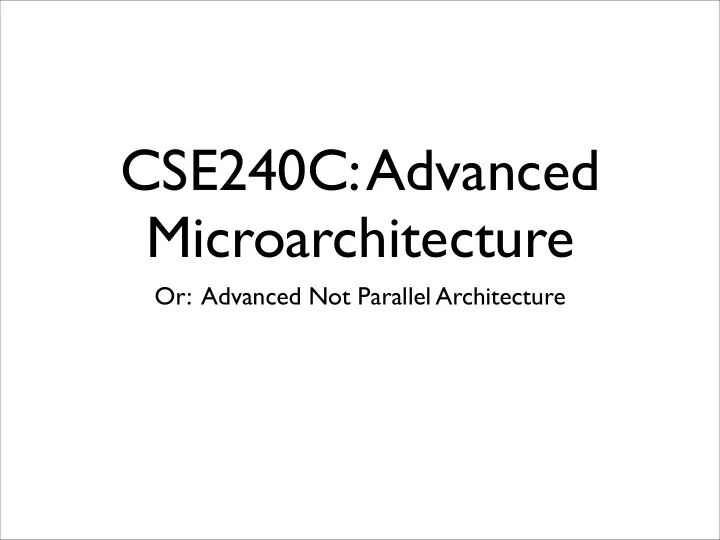

CSE240C: Advanced Microarchitecture Or: Advanced Not Parallel Architecture
Scope • Everything in architecture that is not parallel. • Really, everything not “coarse-grain” parallel. • We might fudge a little bit on this.
240C Goals • Get a broad picture of architecture • There is much more than 240a • This class has a strong “meta” component • Paper reading skills • Presentation skills • Synthesis skills • Do an exciting research project
Content • Historical perspectives • Case studies of real machines • New approaches to out- • “super brainiac” of-order execution (i.e., exploiting ILP) processors • Specialized • Program analysis and architectures. behavior. • Circuit-level issues • Reliability issues. • Multi-threading
Mechanics • Reading papers • Becoming an expert • Research projects • No tests!
Reading papers • 18 Class meetings, about 36 papers • This is a pretty heavy load. • Discussion format • Class is discussion-based. This means you! • Part 1: Answer questions from previous day • Part II: New material.
Assignments: Paper reading • Read and think about each paper. • Submit a summary. • It is essential that you do this. Your grade depends substantially upon it. • It is also essential that you learn to do this well. • Extracting content from papers is one of the most important skills in grad school.
Paper summaries • Goal 1: Extract the good ideas from the paper. • This means discarding the junk. • Identifying the good parts. • Goal 2: Understand how it fits into its context (i.e., the rest of architecture) • How is it similar/different/an extension of...?
What’s the paper’s goal? • Does it solve a problem? • Demonstrate an opportunity? • Does it provide information?
What does it contribute? • An idea? • A mechanism? • A description of an artifact? • A methodology?
How do the authors substantiate their claims? • Experiments? • Real systems? • Simulation? • Prose arguments? • Examples from “the real world”
How does the paper relate to others? • Refute? • Confirm? • Extend? • Synthesize? • Re-examine? • In light of new tech./new app./new idea
What conclusions do they draw? • Small conclusions • Did their idea work? • How well? • Do you believe them? • Big conclusions • How do they think it should shape the future? • Do you believe them?
How well is the paper crafted? • Does it tell a story? • Is it interesting? • Are the figures easy to understand? • Do they properly highlight the important parts? • Could you summarize the paper after looking at it for 5 minutes? (not for this class, you can’t ;-)
How would you improve the paper? • Technically • Presentation • Different approach • Organization (maybe you should • Additional write a paper?) background • Methodology • Be concrete -- “make • Experiments it more clear” is not useful.
What questions does it raise? • Issues with their approach? • Directions for new work? • Broader questions about architecture? • What didn’t you understand?
Daily paper assignment • Submitted via WebCT • Due 10 minutes before class -- no exceptions. • You should never miss class for this • You should bring a printed version of each paper to class!
Becoming an expert • In place of the mid term and exam... • You will present 1 day worth of material in class • Become an expert on the topic. • Prepare 40 minutes of slides. • Collect and answer questions for the next day.
Class presentation timeline • 2 weeks ahead: Meet with me about the topic. • 1 week ahead: Send me a draft of your slides • Present your slides, collect questions. • Prepare and present answers • Send me slides with answers • You are responsible for tracking these deadlines. • My schedule fills up fast. Schedule at least 1 week ahea
Evaluating In-class Presentations • Background -- 3 points • How well did you place the papers in context with respect to related work and other papers we've read. • Synthesis -- 4 points • How well did you extract the key contributions and ideas from the paper? How well did you provide additional insight beyond what is in the paper? • Presentation -- 3 points • How good was your presentation? Were your slides well-prepare and clear? • Questions -- 3 points • How well did you record and respond to the questions, including presenting answers at the next class meeting?
Grading Breakdown • three equal pieces • Participation • In-class presentation • Paper summaries
Grading • I grade on 13 point scale F through A+ • You get a letter grade in everything • Your final grade is a weighted average. • There’s no curve in this class. Figuring out your own grade is easy.
Recommend
More recommend